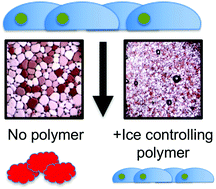Enhanced non-vitreous cryopreservation of immortalized and primary cells by ice-growth inhibiting polymers†
Abstract
Cell cryopreservation is an essential tool in modern biotechnology and medicine. The ability to freeze, store and distribute materials underpins basic cell biology and enables storage of donor cells needed for transplantation and regenerative medicine. However, many cell types do not survive freezing and the current state-of-the-art involves the addition of significant amounts of organic solvents as cryoprotectants, which themselves can be cytotoxic, or simply interfere with assays. A key cause of cell death in cryopreservation is ice recrystallization (growth), which primarily occurs during thawing. Here it is demonstrated that the addition of ice recrystalization inhibiting polymers to solutions containing low (non vitrifying) concentrations of DMSO enhance cell recovery rates by up to 75%. Cell functionality is also demonstrated using a placental cell line, and enhanced cryopreservation of primary rat hepatocytes is additionally shown. The crucial role of the polymers architecture (chain length) is shown, with shorter polymers being more effective than longer ones.

- This article is part of the themed collection: Open access articles from Biomaterials Science


 Please wait while we load your content...
Please wait while we load your content...